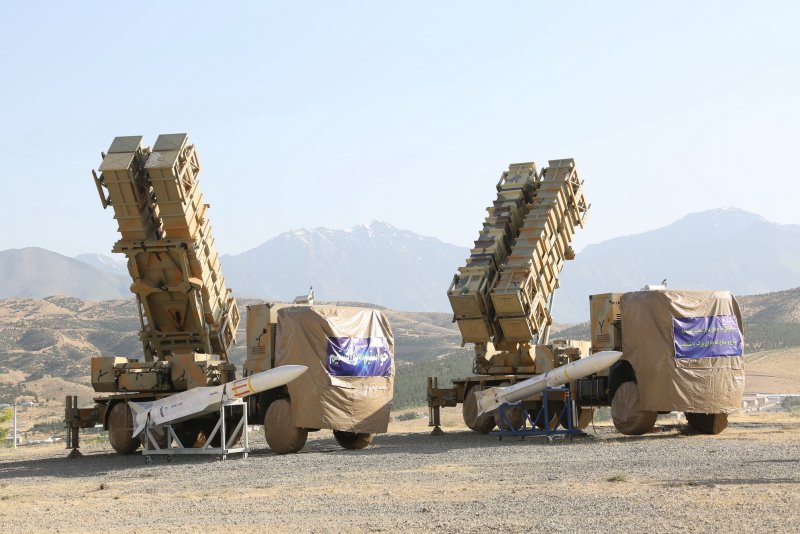The Iranian Defense Ministry unveiled a new surface-to-air missile battery called Khordad 15 during a ceremony Sunday in Tehran. Photo courtesy Iran Defense Ministry/EPA
June 11 (UPI) -- Iran formally delivered a new new surface-to-air missile system, called Khordad 15th, to the Air Defense Force of its army in a ceremony in Tehran.
Built in Iran, the system -- named after the third month of the Iranian calendar -- is capable of detecting six targets within a range of 93 miles at a
maximum height of 17 miles and hit them in a range of 75 miles, Defense Minister Brigadier General Amir Hatami said Sunday in a report by the semi-official Mehr News Agency.
Stealth jets can be targeted at 53 miles and hit within 28 miles, Mehr reported,. Other targets include reconnaissance aircraft, bombers and tactical warplanes.
"It can also be prepared for operation in less than five minute," Hatami said.
The system uses the homegrown Sayyad-3 missile, and is equipped with a phased array radar and independent launch pads.
"Iran will increase its military capabilities to protect its national security and interests, and it will not ask permission from anyone on this matter," Hatami said at the unveiling.
In February, the country successfully tested the Hoveizeh long-range cruise missile at a range of around 800 miles, including the capability of reaching Israel.
Later in the month, a midget Ghadir-class submarine fired an anti-ship cruise missile for the first time.
Before Sunday's ceremony, Iran's foreign minister urged European countries to uphold commitments under the 2015 nuclear accord.
Mohammad Javad Zarif criticized European and Western policies as having "only caused damage in the region." He said "Europeans are not in a position to criticize Iran for issues outside the JCPOA," referring to the Joint Comprehensive Plan of Action, also known as the Iran nuclear deal.
"Now some countries like Germany have stopped selling arms to Saudi Arabia for bombarding the people of Yemen, some other countries haven't done so," he added. "In general, the West has allowed the autocratic regimes in our region to commit crimes."
In early May, Europe and China were given a 60-day deadline for Iran to resume enriching uranium to a higher degree than permitted by the accord if they challenge the U.S. position. Last, year, U.S. President Donald Trump ended the 2015 nuclear deal and reimposed sanctions.
The United States also last month deployed the Abraham Lincoln aircraft carrier strike group to the Persian Gulf last month, as well as B-52 bombers and an additional 1,500 troops, to counter imminent concerns about Iranian action.
Acting Defense Secretary Patrick Shanahan told a Senate Appropriations Defense subcommittee last month there was a "very, very credible" intelligence that Iran was preparing to attack U.S. forces or interests in the region.















